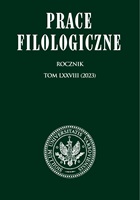A COGNITIVE ANALYSIS Of POLISH FOLK PLANT NAMES
A COGNITIVE ANALYSIS Of POLISH FOLK PLANT NAMES
Author(s): Hubert Kowalewski, Katarzyna ProrokSubject(s): Customs / Folklore, Sociolinguistics, Cognitive linguistics, Western Slavic Languages, Culture and social structure
Published by: Wydział Polonistyki Uniwersytetu Warszawskiego
Keywords: Polish folk culture; cognitive grammar; construal;
Summary/Abstract: The article proposes a cognitive analysis of selected Polish folk plant names. In cognitive linguistics meanings are identified with conceptual representations construed in certain ways, and multiple alternate construals of one referent may be associated with various phonological forms. For example, twardziec and rannik, two folk names of yarrow (Achillea millefolium L.), illustrate two different construals of the referent, since the names evoke two different concepts associated with the plant: the former name alludes to hardness (cf. Polish twardy ‘hard’), and the latter – to the fact that yarrow was used for healing wounds (cf. Polish rana ‘wound’). Since the conceptual representations depend crucially on the cognitive faculties of the conceptualizer, analyses of representations encoded in plant names offer insights into mental realm of the speaker. The study attempts to reconstruct the conceptualizations behind Polish plant names and reveal the ways in which the members of the folk community understood and experienced the world of plants. The main theoretical framework used throughout the study is derived from Langacker’s Cognitive Grammar.
Journal: Prace Filologiczne
- Issue Year: 78/2023
- Issue No: 1
- Page Range: 109-128
- Page Count: 20
- Language: English

